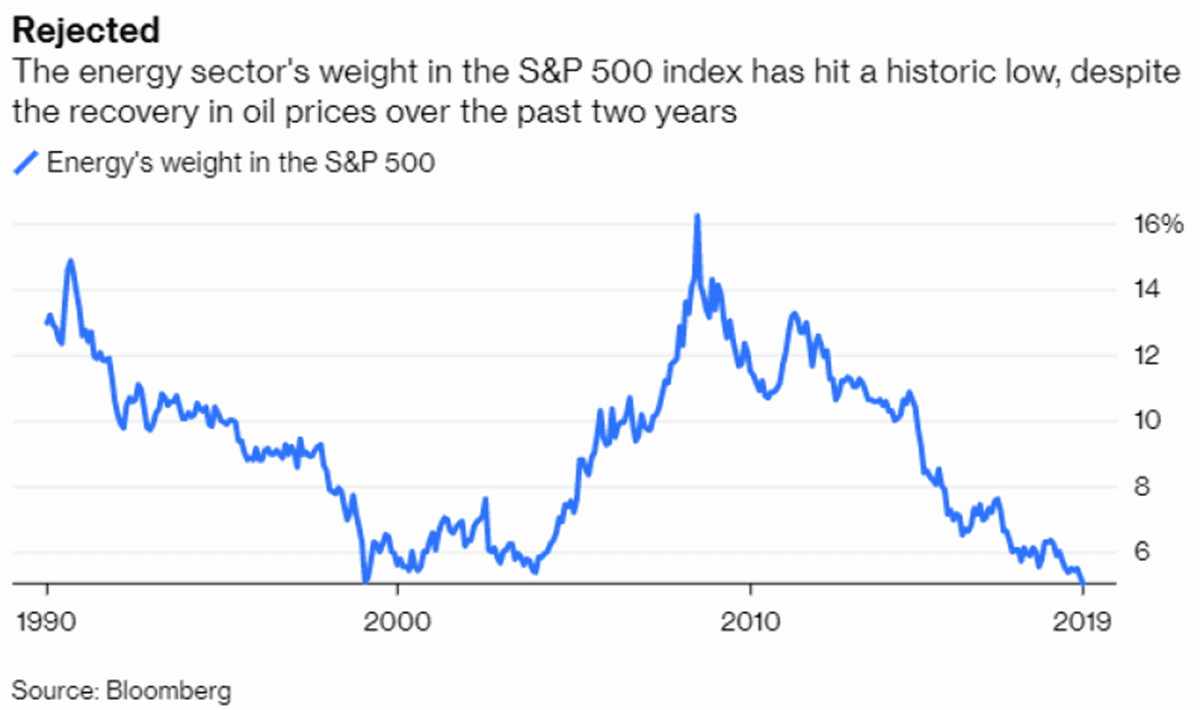Dear fellow investors,
We have argued recently that since almost nobody is worried about inflation, there are wonderful opportunities for investments which would benefit from the crowd being wrong. One of the all-time great investors in these inflation-oriented assets is Chicago’s Sam Zell. Sam is affectionately called “The Grave Dancer” because he has amassed a multi-billion-dollar fortune buying hard assets from distressed buyers.
Here is what he said on November 14, 2019 on Bloomberg TV comparing buying real estate assets in the disarray of the bank/savings and loan crisis of the early 1990s to buying today’s oil properties:
Q3 2019 hedge fund letters, conferences and more
“Where (in real estate) you had empty buildings all over the place and few investors had cash to play. These oil properties look like that now.”
Most investors consider what Sam Zell does as very risky. He provides ownership capital to projects in distress. Warren Buffett describes this by saying, “What the wise man does at the beginning, the fool does at the end.” Zell attempts to get in somewhere around the bottom when it appears that meritorious income-producing property is being left for dead. Hence the nickname, “The Grave Dancer.”
Sam’s latest investment arena is buying the income streams of oil properties in Colorado, California and Texas. He said oil companies are preempting downside risk by obtaining capital from him and giving him incredibly attractive terms. He points out how big the void in capital is available to the energy industry, specifically oil. We have argued this shows up in the percentage of the S&P 500 Index which is invested in energy (see chart below):
Ironically, as we were writing this piece, Berkshire Hathaway (BRK) announced that they began to buy Occidental Petroleum (OXY) in the third quarter of 2019 at what looks like prices around $45 per share. To understand why they are buying, you might review our missive entitled, “Buffett and Munger Would Say Buying OXY Is Easy.” You might say Buffett/Berkshire Hathaway is a “grave dancer” in quality common stocks with a high margin of safety.
This brings us to a recent open letter written for Occidental Petroleum owners by the successful activist investor, Carl Icahn. As an owner of 23 million shares of OXY, Icahn claims that present management makes the company an “extremely dangerous” investment despite dropping from $65 per share before buying Anadarko Petroleum earlier this year to around $38 per share on November 14, 2019.
Carl Icahn is a brilliant investor who primarily operates as an activist. He buys a large position in a company and then advocates for decisions which will drive the stock higher in the next 12 to 18 months. Sam Zell is a brilliant investor who buys real assets, like the ones owned by OXY, when everyone else considers them “extremely dangerous.” He uses his lonely optimism in sectors where there is no optimism. Throw Buffett in there and be reminded that Berkshire doesn’t like pessimism, they just like the prices it affords.
Why are these great investors seemingly on opposite sides of this argument? First, Icahn’s activism usually results in decisions made by existing management in agreement with his wishes and buying Anadarko was directly against his wishes. Secondly, Icahn is not handling his anger very well. He seems to be cutting off his nose to spite his face, because in this momentum-driven equity market that is dominated by index and algorithm investors, you only curse the company by whining in the public domain as you sell.
Zell and Berkshire are being unemotional and recognizing that the assets in the ground are worth dramatically more than the stock market is giving companies credit for. Buffett and Munger probably believe that exchanging massively over-priced debt for seriously undervalued oil assets was wise on OXY’s part.
Others would consider most of Zell’s investments as “extremely dangerous” because he is buying depressed assets which might not bounce back immediately. We are choosing to think that the emotional approach investors are taking in OXY shares are a long-term buy signal. Buffett always says, “You pay a high price for a cheery consensus!” We would say that Carl Icahn’s despair is helping to create an even bigger bargain than normal in an arena that the “grave dancer” is positive about. Stay tuned!
Warm regards,
William Smead
The information contained in this missive represents Smead Capital Management’s opinions, and should not be construed as personalized or individualized investment advice and are subject to change. Past performance is no guarantee of future results. Bill Smead, CIO and CEO, wrote this article. It should not be assumed that investing in any securities mentioned above will or will not be profitable. Portfolio composition is subject to change at any time and references to specific securities, industries and sectors in this letter are not recommendations to purchase or sell any particular security. Current and future portfolio holdings are subject to risk. In preparing this document, SCM has relied upon and assumed, without independent verification, the accuracy and completeness of all information available from public sources. A list of all recommendations made by Smead Capital Management within the past twelve-month period is available upon request.
©2019 Smead Capital Management, Inc. All rights reserved.
This Missive and others are available at www.smeadcap.com.






